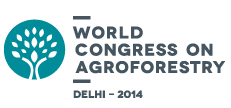New technologies to old problems: Online Role Playing Games, Farmers and Coffee agroforestry in the Western Ghats
New technologies to old problems: Online Role Playing Games, Farmers and Coffee agroforestry in the Western Ghats
wca2014-1988 Maelle Delay 1 2Anne Dray 1Jenu Kalla 1,*Konerira M. Nanaya 1 3Cheppudira G. Kushalappa 3Yenugula Raghuramulu 4Philippe Vaast 5Christophe Le Page 6Terence Sunderland 7Claude Garcia 1 8 1Forest Management and Development Group, ETHZ, Zurich, Switzerland, 2Livelihood Program, CIFOR, Bogor, Indonesia, 3College of Forestry, University of Agricultural and Horticultural Sciences, Shimoga, 4Central Coffee Board, Bangalore, India, 5UMR Eco&Sols, 6UPR GREEN, CIRAD, Montpellier, France, 7Livelihood Programme, CIFOR, Bogor, Indonesia, 8UPR Goods and Services of Tropical Forest Ecosystems, CIRAD, Montpellier, FranceProblems of natural resources management are often wicked problems. They involve multiple stakeholders with different worldviews, different needs and agendas, in a world with pervasive uncertainties. The answers to such problems are not technical fixes but political process that engage the stakeholders in problem solving iterative loops. However, new technologies, particularly IT, can help navigate the complexities of designing efficient natural resources management schemes. We present here an initiative to develop online participatory tools to contribute to an on-going policy debate in the coffee agroforestry systems in the district of Kodagu (India). In this landscape, driven by market incentives and recently available technologies, farmers are intensifying the production system, replacing the complex and diverse canopy cover with the fast growing Grevillea robusta. In the background, farmers and foresters are fighting for the rights over the native tree species. The outcome of this struggle has the potential to alter dramatically the farmers’ strategies and the distribution of biodiversity at the landscape level.
While earlier research quantified past dynamics and highlighted the main drivers of the present trends, tools are lacking for the decision makers to explore the long term, often unforeseen impacts of their proposed interventions. Based on a conceptual model developed through participatory workshops with local stakeholders, we developed a computerized agent-based model using a dedicated modelling platform, NetLogo. This online-enabled modular platform allows stakeholders to interact on a larger scale, to propose alternative futures and policy changes, and to explore the impacts of these proposed changes. We will use it as a springboard for discussion with local stakeholders and policy makers, to broadly disseminate the results of our research, and to encourage local farmers and outsiders alike to contribute meaningfully to the policy process, allowing for surprise and innovation to emerge from the interactions the platform will generate.

